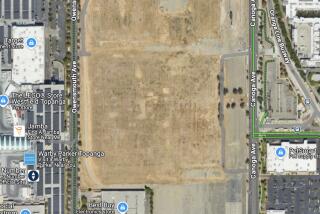Firm Denied Permit to Produce Toxic Gas at La Mesa Location
- Share via
San Diego County air pollution control officials on Wednesday refused to grant a permit to Phoenix Research Corp., the embattled La Mesa toxic-gas manufacturer, contending the facility could pose an unacceptable health risk in the event of an accident.
The decision by the Air Pollution Control District could force the company to close, district officials said. Under public pressure, Phoenix has already announced plans to move to Washington state if it receives approval from environmental authorities there.
In the meantime, Phoenix has 10 days to petition the county’s Air Pollution Control Hearing Board to review the district staff’s decision. If the company takes that step, it would be allowed to operate pending the outcome of its appeals.
Phoenix Research produces arsine and phosphine gas, two extraordinarily toxic gases used in the semiconductor industry. Exposure to as little as 500 parts per million of arsine is almost instantly lethal, destroying red blood cells by freeing the hemoglobin.
The company, owned by Union Carbide Corp., has operated for 13 years out of a small warehouse on Alvarado Road. Many public officials, including the Air Pollution Control District, were unaware of its existence until an article in The Times in November, 1985, disclosed its presence.
Publicity generated by that article prompted the Air Pollution Control District to ask Phoenix late last year to apply for a permit to operate. Phoenix claims to have no regular emissions, but it must have a permit and safeguards in the event of an accidental emission.
On Wednesday, deputy district director Paul Sidhu said the company failed to propose any new safeguards other than extending the plant’s stack. He said his office concluded that would not be sufficient to protect the public health.
“The conclusion is that if there is an accident, the public in that community would not be protected,” said Sidhu. “. . . At this point, I can say these gases are extremely toxic and lethal. And we have in that neighborhood hospitals, convalescent hospitals, shopping centers, the elderly, infants. So we have some sensitive people who can be adversely impacted.”
He said his office disagreed with the company’s assessment of safe levels of exposure.
“The company’s position is that we should accept certain exposure levels as suggested by industry to be protective of public health,” he said. “In our opinion, based on the information given to us and our consultations with the state Department of Health Services, we believe that the levels protective of public health are much lower than the company is suggesting.”
Phoenix Research’s president, Randall Kelley, could not be reached Wednesday afternoon for comment.
According to Sidhu, the company now has 10 days to petition the hearing board for an appeal. The earliest an appeal could be heard would be Jan. 22, Sidhu said. After that, the company could appeal the board’s decision in Superior Court.
If the company does not appeal, Sidhu said, it would be expected not to operate without a permit. He said his office would check the plant on Friday or Monday and discuss with its lawyers what action to take if it finds the facility still operating.
“If they don’t appeal, we expect them to shut down,” Sidhu said.
Asked what the company could do in order to reapply for a permit, Sidhu said it could propose new modifications. Asked what would be acceptable, he said he could not say because the facility is so unusual. He said it would be up to the firm to propose the safeguards and up to his office to approve or reject them.
Phoenix moved to La Mesa in 1973 and has operated without serious accident since then. Although there have been small mishaps within the plant, Kelley has said there has never been an accidental release of either gas.
But last January, in response to public pressure for the plant to leave, La Mesa Mayor Fred Nagel asked Union Carbide to relocate the facility. Union Carbide officials, in a quick reply, vowed to move out before the plant’s lease expires on Jan. 1, 1991.
In June, plant officials announced they had found a new site in Washougal, Wash., and hoped to move in by next summer. However, the planning and environmental approvals process in Washington has taken longer than anticipated, company officials said, and it might be two years before the move can take place.
More to Read
Sign up for Essential California
The most important California stories and recommendations in your inbox every morning.
You may occasionally receive promotional content from the Los Angeles Times.













